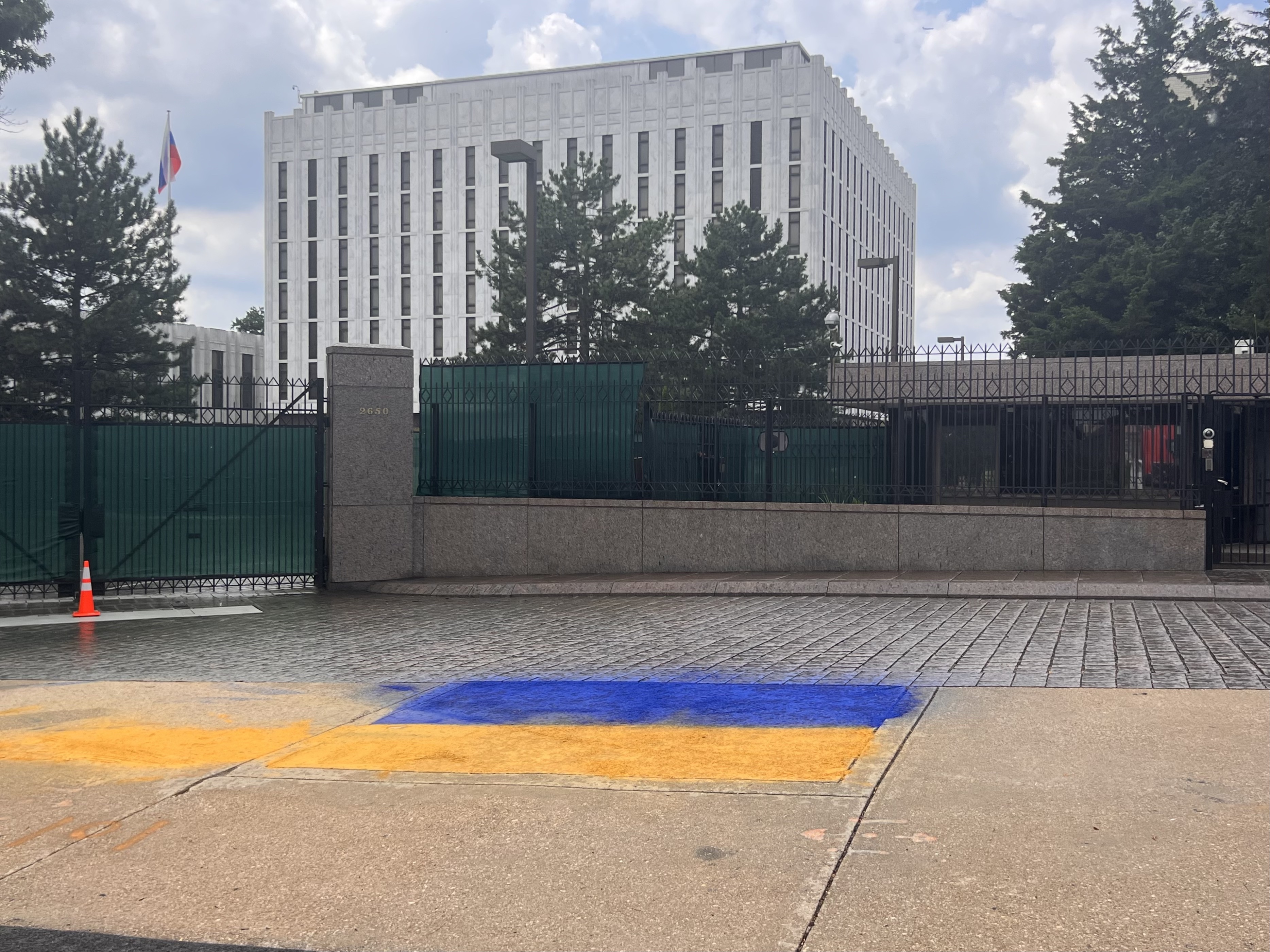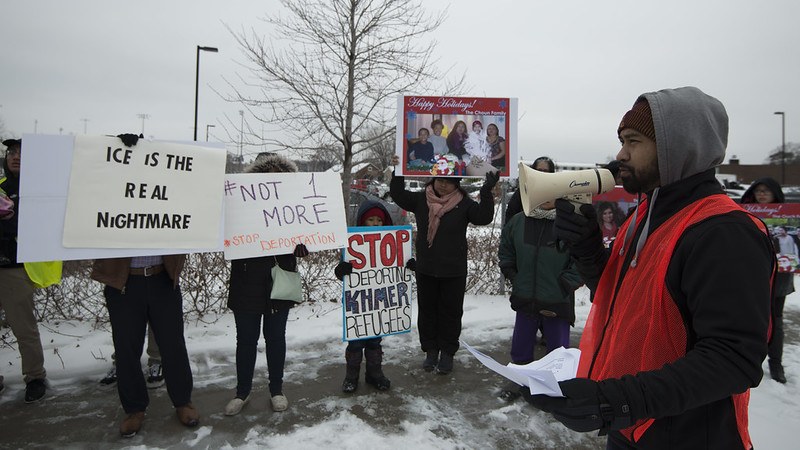The Situation: Hopscotch is Now Illegal on D.C. Sidewalks
And the United States Secret Service is out there to enforce

The Situation on Thursday announced: “I will be observing the occasion of the Alaska summit by painting a giant Ukrainian flag in front of the Russian Embassy in Washington in sidewalk chalk.”
Little did I know when I wrote these words that I would be stumbling when I did so, right smack into the federal takeover of policing on the streets of Washington, D.C.
It is rare that you get a controlled experiment in the changes in law enforcement policy. Of course, many of those changes are taking place before our eyes. We all see those changes plainly with ICE and in the immigration space more broadly. And we see FBI agents getting fired and investigations “announced” of fake crimes by the politically out of power.
But how often do we really know that Person X, arrested for Crime Y, wouldn’t have been arrested for the same act under the last administration? And how often do we know that the arrest flowed from a changed political climate, rather than, say, different personnel making different judgments at different moments in time? One seldom gets to actually experience law enforcement going from standing around watching as someone does a thing—much less specifically okaying his plan to do that very thing in a particular location for a particular reason—to actively enforcing the law against that same person doing that same thing in that same exact spot and for that same exact reason.
That, however, is precisely what I experienced yesterday when I went to the Russian embassy at noon to pour 100 lbs of blue and yellow chalk on the sidewalk.
I had done this operation before, almost exactly a year ago. Indeed, I had made an Instagram video of myself doing it. (In fact, I’ve done and filmed variants of this operation a number of times, and this one is based and joyous and you should definitely watch it, but it’s also not relevant right now.)
Note that the first segment of this video shows me doing a walkthrough of my plans with an officer of the United States Secret Service. In that clip, I explain to the officer my precise plan: that I meant to dump blue and yellow chalk onto the sidewalk—the public sidewalk of Washington, D.C., that is—and sweep it into the sidewalk with a broom into a blue and yellow Ukrainian flag. I would not set foot on the territory of the Russian Embassy compound.
The officer in question specifically okays my plan: “As long as it’s just chalk,” you can hear him say.
That was a year ago.
So yesterday, when I drove over to the embassy with a large quantity of marking chalk, I had every reason to believe that whatever was going on elsewhere in Washington, D.C., however much federal law enforcement was dragooned into being street cops in the District of Columbia, however many National Guard troops might be stationed in Washington, and notwithstanding the president’s purported takeover of the Metropolitan Police Department, none of this would affect my Alaska summit protest.
After all, I had vetted this precise operation with the Secret Service only a year before. And besides, if what I was doing was illegal, drawing a hopscotch course on the sidewalk was a crime too.
The Secret Service, in any event, doesn’t really enforce municipal ordinances. While it has jurisdiction to do so, its job is to protect the president, to protect foreign embassies, to investigate certain financial crimes. It would be completely ridiculous for the United States Secret Service, even in these absurd times, to police street chalk art. Right?
Folks, we live in ridiculous times.
Here is the complete livestream of my operation yesterday in front of the Russian Embassy:
In it, as you can see for yourself, the Secret Service arrives with many cars shortly after I begin chalking the sidewalk—sirens blaring and lights streaming—apparently having heard (presumably from the Russians) that I was pouring lighter fluid on the sidewalk in front of the embassy.
After a lengthy period of verifying that this was false, checking that a colleague and I had no outstanding warrants, verifying that we were merely spreading chalk as a political protest and that we had not—as the Russians apparently also alleged—spray-painted the compound’s pedestrian gate, inspecting the sunflower garden I had planted across the street with Ukrainians and Americans (sunflowers being a symbol of Ukraine) for possible threats, and removing a camera I had planted there with the permission of the landowner to protect the sunflowers (which have a habit of being mysteriously destroyed), the Secret Service officers returned my camera to me, consulted with their headquarters, and then made a remarkable declaration.
Drawing with chalk on the sidewalk, they told me, was a violation of a District of Columbia municipal ordinance that forbids defacing public property. It didn’t matter that the chalk would wash away with the first rain—or that the Russians could come out and hose it down within a couple of hours. While the officers would exercise their discretion not to arrest or charge me and my partner in what was apparently now a crime, if we persisted in chalking the sidewalk, they would have to enforce the supposed law against us.
I agreed to desist, as I always try to cooperate with law enforcement in conducting my operations. I had managed to cover part of the sidewalk in chalk before the officers arrived, so the mission was already accomplished. My enthusiasm for being arrested is, in any event, altogether under control. So I took some pictures of my flag, ended the livestream, replaced my camera in the sunflower garden, packed up the remaining chalk, and went home.
A few aspects of the encounter strike me as worth highlighting, less because of anything to do with the Alaska summit—the reason I was there—than because of the state of policing in Washington, D.C.:
The first is that the rules had changed. What was obviously legal last year was suddenly verboten. Something I had done in active consultation with the Secret Service only a few months ago was now an arrestable offense. There was no explanation. When I asked the lead officer about it point blank, he responded that he hadn’t been here and his commanders apparently hadn’t been at the helm that day. I don’t doubt his good faith. Truly. But I also don’t believe this is the full story, whether he knows it or not. In the past, the Secret Service has shown up at my operations, verified that they are not threatening, and then stood down. Sometimes they have even stayed to protect my rights. They have never shut down one of my protest operations, let alone read a law aggressively to do so.
The second point is that this rule change happened without any change of law. The written law is the same as it was last year. I can’t imagine what the term “reliance interest” means if it doesn’t mean that if you specifically vet conduct with law enforcement and they express no problem with it, you can count on them regarding it as untroubling.
The third point is that the Secret Service was now policing a D.C. municipal ordinance that it was interpreting—as the D.C. police have not, in my experience—to forbid drawing with chalk on the sidewalk. It is hard for me to think of a greater degradation of federal law enforcement than sending uniformed Secret Service to prevent sidewalk chalking.
To state the obvious, it seems to me impossible to understand these changes as reflecting anything other than a change in political climate. In our new climate, federal law enforcement is now involved in local D.C. policing, protest activity is being constrained and people are facing deportation for writing op-eds, and the rules change arbitrarily in fashions unfavorable to disfavored causes. (That the plight of Ukraine, even as the American president fetes the Russian war criminal and adopts his view that a ceasefire is not necessary for peace talks between the invader and the invaded, counts as a disfavored cause is a shanda for a different column.)
I intend to explore my legal options with respect to this matter. Color me skeptical that a municipal ordinance (and I assume this is the ordinance the officers were referring to) that forbids the following can reasonably and constitutionally be read to preclude hopscotch, public art, or peaceful protests with chalk on city sidewalks:
It shall be unlawful for any person or persons willfully and wantonly to disfigure, cut, chip, or cover, rub with, or otherwise place filth or excrement of any kind; to write, mark, or print obscene or indecent figures representing obscene or objects upon; to write, mark, draw, or paint, without the consent of the owner or proprietor thereof, or, in the case of public property, of the person having charge, custody, or control thereof, any word, sign, or figure upon:
(1) Any property, public or private, building, statue, monument, office, public passenger vehicle, mass transit equipment or facility, dwelling or structure of any kind including those in the course of erection; or
(2) The doors, windows, steps, railing, fencing, balconies, balustrades, stairs, porches, halls, walls, sides of any enclosure thereof, or any movable property.
But there is one aspect of the Secret Service’s action yesterday whose legality I do not doubt; that is the president’s authority to deploy federal law enforcement to enforce the most trivial stuff in my hometown. If President Trump and Attorney General Pam Bondi want to turn a great federal law enforcement agency—and my general respect for the way the Secret Service handles embassy protests is enormous—into a bunch of nitpickers enforcing municipal rules under a tendentious interpretation at the request of the Russian Embassy, he gets to do that.
The only remedy available to me for that is mockery. So with sadness in my heart, I will be making a video today out of the footage of this livestream, and that video will, alas, mock the Secret Service for policing chalk protests on the streets of Washington.
Because if you are not mocking The Situation, you are part of the The Situation—which continues tomorrow.





